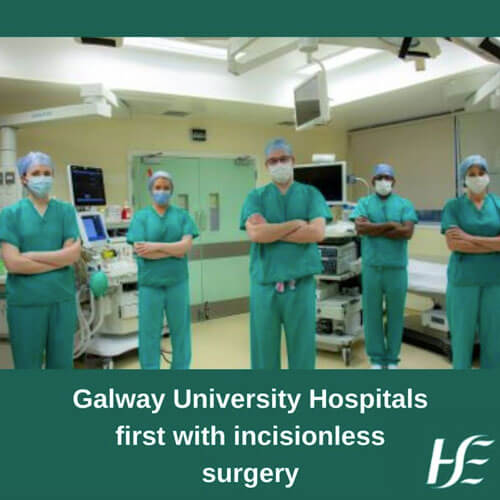
Galway University Hospitals has become the first hospital in Ireland to introduce an ‘incisionless’, minimally invasive surgery to help correct blockages of the oesophagus caused by a rare condition called achalasia, that causes a blockage in the muscles of the lower oesophagus causing dysphagia or difficulty in swallowing.
The procedure was carried out by Mr Paul Carroll, Consultant Oesophagogastric and General Surgeon, specialising in minimally invasive surgery and endoscopic surgery for oesophago-gastric cancer and benign disease.
Traditionally, treatment of Achalasia involves procedures to repeatedly dilate/open the oesophagus or, alternatively, requires laparoscopic surgery. The traditional surgery divides the muscles of the lower oesophagus through several small incisions in the abdomen.
However, surgeons in GUH have now undertaken an incisionless procedure using Peroral Endoscopic Myotomy (POEM). POEM uses an endoscope, a narrow flexible tube with a camera, to breach the lining of the oesophagus. The endoscope is inserted through the mouth and can be positioned into the space between the oesophageal lining and the muscles, allowing it to divide these muscles internally. The breach is then closed with special clips.
One of the significant benefits of this procedure is the ability to treat a subtype of achalasia that features chest pain. This requires a longer division of the muscles along the length of the oesophagus, which is traditionally challenging to treat with standard surgery. POEM can also be used as a rescue, or second-line intervention, where other treatments have failed. Patients are discharged the following morning without pain and with a resolution of symptoms.
The introduction of this procedure has added to the expanding Minimally Invasive Upper GI Programme in Galway and the Saolta University Health Care Group, which also provides endoscopic surgical interventions for early oesophageal and gastric cancers. GUH is one of only two centres in Ireland with this capability.
Mr Paul Carroll, Consultant Oesophagogastric and General Surgeon at Galway University Hospitals, thanked his team for their support in bringing the procedure to Irish patients:
“I am personally delighted that I have been able to introduce this procedure into Ireland for treatment of this disease process. It would not have been possible without the support and training I received whilst on fellowship in the University of Toronto. Nor would it have been possible without the unwavering support of the late Marie Farragher, Clinical Nurse Manager in theatre, and her team of nurses for pushing boundaries with me.”
Chris Kane, General Manager of Galway University Hospitals also praised the innovation, noting that “these innovations focus on and enhance the patient experience. They improve care and treatment options for all our communities and we are delighted to facilitate this innovative surgery at GUH.”

